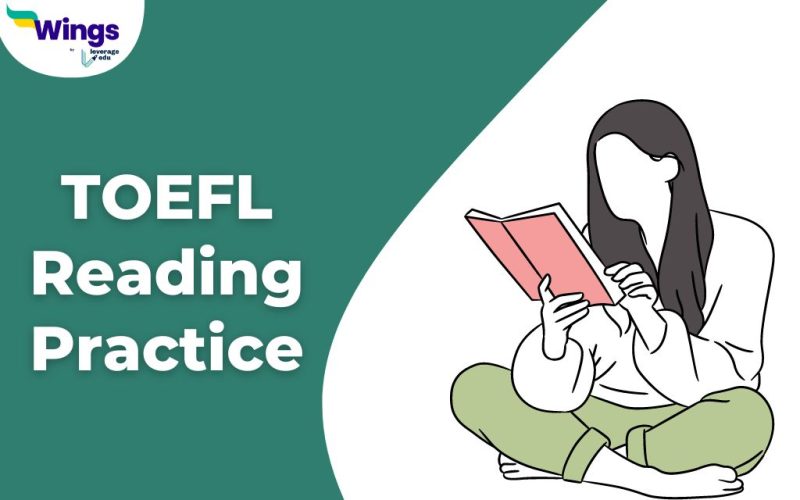The Test of English as a Foreign Language (TOEFL) is a crucial step for many non-native English speakers seeking admission to universities or pursuing other academic or professional endeavours in English-speaking countries. Among the four sections of the TOEFL, the Reading section can be particularly challenging. It evaluates your ability to comprehend and analyze complex texts from various fields. To excel in this section, effective TOEFL Reading practice is essential. In this blog, we’ll delve into strategies and tips to make the most of your TOEFL Reading practice.
This Blog Includes:
- Best Tips to Ace TOEFL Reading Section
- Understanding the Structure of TOEFL Reading
- Set a Solid Foundation
- Familiarize Yourself with Passage Types
- Focus on Active Reading
- Enhance Skimming and Scanning Skills
- Practice Time Management
- Analyze Question Types
- Review and Learn from Mistakes
- Simulate Real Exam Conditions
- Gradually Increase Complexity
- Seek Professional Guidance
- FAQs
Best Tips to Ace TOEFL Reading Section
Below mentioned are some of the best tips to ace your TOEFL reading section:
Understanding the Structure of TOEFL Reading
The TOEFL Reading section consists of three to four reading passages, each followed by a set of questions. The topics vary, ranging from natural sciences to social sciences, and the humanities. Understanding the passage types and question formats is crucial for successful practice.
Set a Solid Foundation
Before diving into TOEFL Reading practice, ensure you have a solid grasp of English language fundamentals. This includes a robust vocabulary, familiarity with sentence structures, and the ability to understand nuanced meanings.
Learning Tip: Start by reading a variety of materials such as newspapers, academic articles, and novels to enhance your comprehension skills.
Familiarize Yourself with Passage Types
TOEFL Reading passages often fall into categories like academic topics, social sciences, natural sciences, and business. By practising with diverse passage types, you’ll become more comfortable with different writing styles and subject matters.
Learning Tip: This familiarity will help you navigate through passages with confidence during the actual exam.
Also Read: 5 Common Mistakes to Avoid During TOEFL Preparation
Focus on Active Reading
Active reading involves engaging with the text by highlighting key points, making notes, and summarizing the main ideas. Practice this technique while reading TOEFL passages.
Learning Tip: It will not only help you retain information but also assist in answering questions that require you to refer back to specific details.
Enhance Skimming and Scanning Skills
In the limited time provided, skimming and scanning can be your best friends. Skim through the passage quickly to grasp its main idea, tone, and structure. Then, scan for specific information required to answer questions.
Learning Tip: Practicing these skills will save you time during the actual exam and allow you to focus on the most pertinent details.
Also Read: 99+ Top Synonyms List to Strengthen Your Vocabulary
Practice Time Management
Time management is crucial during the TOEFL Reading section. Each passage comes with a set of questions, so allocate a specific amount of time for reading and answering.
Learning Tip: Practicing with a timer will help you develop a rhythm and ensure you don’t spend too much time on a single passage.
Analyze Question Types
TOEFL Reading questions come in various formats, such as multiple-choice, summary completion, and inference-based questions. Understanding the different question types will enable you to approach each question strategically.
Learning Tip: For instance, multiple-choice questions often have distractors that can confuse you if you’re not careful.
Also Read: TOEFL Sample Speaking Questions
Review and Learn from Mistakes
After completing a TOEFL Reading practice set, review your answers and understand the rationale behind each correct answer. Pay attention to your mistakes and figure out why you chose the wrong option.
Learning Tip: Learning from these errors is instrumental in refining your approach and avoiding similar pitfalls in the future.
Simulate Real Exam Conditions
Regularly simulate real exam conditions while practising. Find a quiet place, time yourself, and use official TOEFL practice materials or reputable study resources.
Learning Tip: This will help you acclimate to the pressure and time constraints of the actual test.
Also Read: TOEFL Sample Essays
Gradually Increase Complexity
Begin your practice with passages of moderate difficulty and gradually progress to more complex ones. This gradual progression will build your confidence and analytical skills, ensuring you’re prepared to tackle even the most intricate texts on the actual TOEFL exam.
Seek Professional Guidance
If you’re struggling with TOEFL Reading practice, consider seeking guidance from professional tutors or online resources. They can provide personalized strategies, identify your weaknesses, and offer targeted exercises to improve your performance.
Also Read: How to Prepare for the NEW TOEFL Online?
FAQs
The full form of TOEFL is the Test of English as a Foreign Language.
The candidates will be asked to solve 30-40 questions in the TOEFL reading section.
The TOEFL examination is held for the students who are willing to study abroad and have English language proficiency as well.
By following the strategies outlined in this blog, you’ll be well-prepared to navigate the complexities of the Reading section. Remember, consistent and targeted practice is the key to mastering TOEFL Reading and achieving your desired score.
Build a plan with Leverage Edu‘s Leverage Live classes and our top trainers and strengthen your English score as well as your application so that you can secure your spot in your dream college.


 One app for all your study abroad needs
One app for all your study abroad needs












 60,000+ students trusted us with their dreams. Take the first step today!
60,000+ students trusted us with their dreams. Take the first step today!